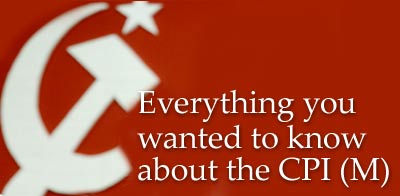
On May 17, the Communist Party of India-Marxist committed another 'historical blunder.' It decided not to join the Congress-led coalition government that will be sworn in on Saturday.
This is the second time the Marxists have rejected the chance to participate in the central government. In 1996, the CPI-M was on the verge of joining the government; then West Bengal chief minister Jyoti Basu was tipped to become prime minister and head the then United Front government. But a powerful lobby within the CPI-M rejected the idea, which later Basu regretted as 'a historical blunder.'
FROM THE REDIFF ARCHIVES: 'In politics there are moments when you have to rise to the occasion and you've got to cater to the need of the hour and the pleas of the people'
Why do the Marxists let go of rare political opportunities? Who decides what in the CPI-M?
A guide to the Marxist leadership in India:
Who is the CPI-M boss?
The general secretary. Harkishan Singh Surjeet, 88, is the CPI-M's current general secretary.
Who are the other senior leaders?
Former West Bengal chief minister Jyoti Basu, E Balananandan, Kerala Opposition leader V S Achuthanandan, Prakash Karat and Sitaram Yechury, the party's young economic ideologues, S Ramachandra Pillai, West Bengal Chief Minister Buddhadeb Bhattacharya, Tripura Chief Minister Manik Sarkar, West Bengal state secretary Biman Bose, Kerala state secretary Pinarai Vijayan, and M K Pandhe, president of the CPI-M's trade union, the Centre of Indian Trade Unions among others.
ALSO READ: Meet the Left Front
Who takes crucial decisions such as whether the CPI-M should join the central government or support it from outside?
The CPI-M has two apex decision-making bodies -- the 17-member Politburo and the 79-member Central Committee. These two powerful bodies take all the major decisions.
ALSO READ: What the Left Wants
How do the Politburo and Central Committee function?
The Politburo discusses the party's major policy decisions. It then drafts a proposal and submits it to the Central Committee for approval.
Which is the CPI-M's highest body -- the Politburo or the Central Committee?
The Central Committee is the CPI-M's decision-making body. Only the Central Committee has the power to ratify or turn down crucial decisions.
Does everyone get an opportunity to talk in the Central Committee?
The Politburo and Central Committee meetings are generally held for two days to allow every member to express his point of view on key matters. All crucial decisions are then put to vote.
What happened at the Central Committee meeting on Monday, May 17?
It discussed whether the party should join the Congress-led coalition government. Some leaders were for it; others were vehemently opposed.
At the end of the meeting, the issue was put to vote. An overwhelming majority -- 54 members -- voted against the proposal, thereby formally shutting the doors on the Left Front's participation in the new government.
ALSO READ: Who gave the Left authority to dictate economic policy?
Who argued for joining the government?
Harkishen Singh Surjeet, Jyoti Basu and Sitaram Yechury pressed for having CPI-M ministers in the United Progressive Front government.
It was a rare chance they argued for the party to participate in the central government for the first time.
They said the party's economic policies could be better implemented if it is part of government.
They argued it would help the CPI-M spread its influence across the country and become a national force.
Who opposed the proposal?
The powerful Kerala and West Bengal lobby led by Buddhadeb Bhattacharya, V S Achuthanandan, Pinarayi Vijayan, S Ramachandran Pillai and Prakash Karat rejected the idea of joining the government.
They argued that joining the government would wreck the party's main bases in Kerala and West Bengal.
They said if the party joined the government, it would have to take the blame for every unpopular and controversial decision the new government might take.
Therefore, they said it would be prudent to offer issue-based support to the UPF government from outside.
Image: Rahil Shaikh





